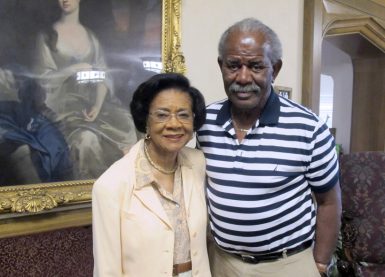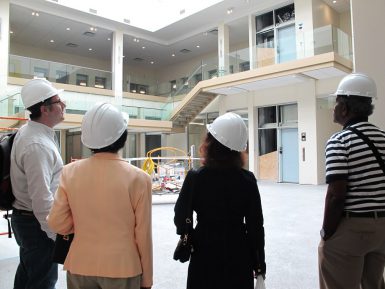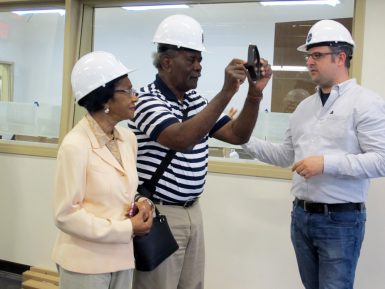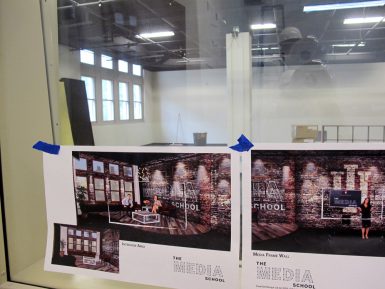Archive donors Davis, Moore visit Franklin Hall

Hard hats on, Belva Davis and Bill Moore navigated scaffolding, construction materials and caution tape to tour the Ken and Audrey Beckley Studio in the newly renovated Franklin Hall, the future home of The Media School, during a visit last week.
The couple, both retired from broadcasting, were interested in seeing the state-of-the-art broadcast production facility. But they also were on campus to catch up with archivists at the school’s Black Film Center/Archive, who are working with a collection of tapes Davis and Moore donated last year.
The couple’s collection documents events and award ceremonies of the Black Filmmakers’ Hall of Fame. The tapes feature speeches from African American celebrities, including James Earl Jones and Sidney Poitier, as well as trailblazing filmmakers.
“The expertise of each person is just an amazing service,” Davis said of the preservation efforts at the center. “They really are providing for future generations the opportunity to see and hear these films for themselves.”
The center is dedicated to the collection and preservation of films by and about African Americans. It’s the largest center of its kind, and its holdings have doubled because of the addition of the hall of fame collection.
“This collection puts the BFC/A, as well as IU and The Media School, in the vanguard of the study of contemporary African American film,” said Michael Martin, director of the center.

Davis, an award-winning broadcast journalist, and Moore, photojournalist and educator, were longtime volunteers for the hall of fame, and Davis later became the producer of the hall of fame awards show. Because of their involvement with the organization, the couple saved tapes of the events that represent about 20 years of hall of fame ceremonies.
“We kept the records because we knew we were really recording important history,” Davis said. “We knew somebody had to keep it around and preserve it.”
Davis learned of the Black Film Center/Archive after her friend and colleague Mary Perry Smith donated her own collection of tapes to the center.
The tapes from the hall of fame now are being digitized, thanks to the $15 million Media Digitization and Preservation Initiative IU President Michael McRobbie launched three years ago. MDPI aims to digitize, preserve and make available all critical media owned by the university.
“The initiative presents a really great opportunity in that a collection like this is going right from the donation into the digitization process, which otherwise it might take years to accomplish a transfer like this,” said the center’s senior archivist Brian Graney.
In addition to expanding the center’s holdings, the collection could be a valuable resource for students pursuing a new specialization, Black Cinema Studies, as part of their bachelor’s degree work.
“This collection has a special relevance to teaching as well as research,” Martin said. “It will yield several dissertations and massive theses. It’s an incredible collection that will support anyone doing any serious work in the study of black film.”

Davis’ and Moore’s own experiences personify some of the curriculum options for that specialization, which includes courses such as Black Women Make Movies, Cinemas of the Black Diaspora and an internship at the Black Film Center/Archive.
Davis experienced success in her broadcast journalism career at a time when women and African Americans were treated poorly in the industry.
“Between the gender and the color problem, I never figured out which one was most damaging to me,” said Davis, recipient of eight local Emmy awards and lifetime achievement awards from American Women in Radio and Television and the National Association of Black Journalists. “There were no women working as a street reporter, and I was the first out there.”
But paving the way for female and minority journalists wasn’t easy. Davis said she endured harassment and discrimination.
“Oftentimes, it was tough just getting into a room because women were not included in the men’s club,” Davis said. “I had to either put up with whatever the shenanigans were or I found some other way to carry myself.”

Like Davis, Moore succeeded despite facing racism in the journalism industry. After decades as a photojournalist and cameraman, Moore now teaches digital video and broadcasting at Ohlone College in Freemont, California.
“The television industry that’s out there today is pretty different from when I started many years ago,” Moore said. “I started television when we shot black and white film. I watched all these things change, and that’s probably what’s kept me here.”
As an expert in videography, Moore was intrigued by the technology, particularly the lighting, featured in the new Beckley Studio in Franklin Hall.
Designers wanted to keep the windows in the industrial-themed studio, but had to find a way to control the light when filming. The cameras will be equipped with special lenses that can increase or decrease light coming in from the windows, a technology Moore couldn’t have dreamed of during his years.
Davis and Moore said they are looking forward to cultivating and inspiring the next generation of media professionals through ensuring their collection becomes digitally accessible to students.
Drawing on her own experiences, Davis offered career advice for Media School students.
“Look at your goals, and let life’s opportunities come alive in you,” Davis said. “Learn the field and then try to make yourself comfortable with stepping out of your plans.”

